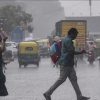A sweltering heatwave, fueled by carbon pollution, is wreaking havoc in southern Europe, posing severe health risks to the elderly and those with pre-existing medical conditions. As temperatures soar, locals and tourists alike are struggling to cope with the relentless heat, with reports of people collapsing in Greece and Italy.
The heatwave is expected to peak in the coming days, with temperatures forecast to reach 42C in Athens on Saturday, 41C in Seville on Monday, and 40C in Rome on Tuesday. The culprit behind this intense heat is an area of high pressure known as Cerberus, which is bringing hot air from Africa to Europe.
“This is a clear sign of the warming climate,” says Alvaro Silva from the World Meteorological Organisation. “By 2050, about half of the European population may face high or very high risk of heat stress in summer.”
The region has warmed by nearly 2C since the Industrial Revolution due to the release of heat-trapping gases and the destruction of natural habitats. El Niño, a natural weather pattern that has returned after a three-year hiatus, is expected to exacerbate the situation.
A study by the World Weather Attribution found that climate breakdown made hot temperatures in Spain, Portugal, Morocco, and Algeria at least 100 times more likely last month. As the heatwave intensifies, doctors, scientists, and officials are urging people to take extra precautions to stay safe.

In Spain, the Red Cross has advised people near wildfires to stay indoors and shut windows. Volunteers have been handing out bottles of water at tourist sites, and authorities have implemented contingency measures to cope with the extreme temperatures. Construction and delivery workers have been banned from working during the hottest hours of the day, and public and private sector employees have been encouraged to work remotely.
Hospital admissions increase when temperatures rise, said José Valencia-Martín, a doctor and public health expert at Virgen del Rocío university hospital in Spain. “The prevention and control of the effects of increasingly frequent, prolonged, and intense heatwaves is a challenge.”
Heatwaves are often referred to as “silent killers” because most deaths go uncounted in official statistics. A small proportion of deaths are directly attributed to heatstroke and dehydration, while many more are the result of hot weather compromising the body’s normal functioning, particularly in people with underlying health issues.
“All of us can be a victim of heat,” said Ana Vicedo-C Cabrera, head of the climate and health research group at the University of Berne. “It doesn’t mean heat will kill us only if we are working in the field at 40C. If you’re a frail individual exposed to heat, your chance of going to hospital or dying increases.”
Prolonged exposure to hot temperatures, combined with hot nights that fail to provide respite, is taking a toll on the vulnerable. Scientists warn that cities that have learned to cope with heat have managed to reduce death tolls when temperatures spike. Some have reduced urban temperatures by adding green spaces, while others have developed heat action plans and early warning systems to prepare citizens and emergency services.
To stay safe, Valencia advises drinking water, avoiding direct exposure to the sun, wearing light clothing, and applying sunscreen. As the heatwave continues to wreak havoc in southern Europe, it is clear that immediate action is needed to mitigate its impacts and protect the most vulnerable members of society.

